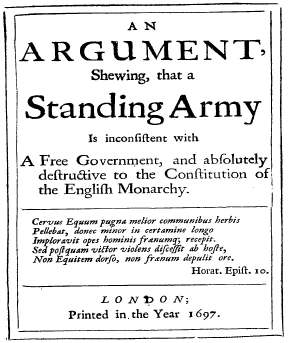Liberty Matters
Taxation in 18th-Century Britain

A quick comment on Joseph Stromberg’s remarks on regressive taxation:
Dr. Wootton suggests that British taxation was no more regressive than continental taxation. If so, it was far more productive. Joel Mokyr states that in the 18th-century only the Dutch paid higher rates. He also underscores the centrality of regressive taxes. John Brewer holds that after 1714 indirect taxes (customs, excises) provided about 70 percent of steadily increasing revenues.
There’s no doubt that British taxation was both regressive and productive. The puzzling question is whether it was more regressive than other European tax systems.
Indirect taxes are generally regressive, but not if they fall on luxuries; so the mere fact that a high proportion of British taxation was indirect doesn’t tell us that it was exceptionally regressive. Mokyr’s claim that it fell mainly on the middle class suggests that it was very far from regressive, as the middle class were only a very small proportion of the population, most of whom were much poorer. According to Samuel Clark, State and Status (McGill-Queen’s Press, 1995, p. 114), indirect taxes were a higher proportion of government revenue in Britain than in the Austrian Low Countries and in France, and what increased was the proportion of tax coming from excise, not from customs. This certainly suggests that the tax system was becoming more regressive (since customs duties would tend to fall on luxuries); and possibly that it was more regressive than elsewhere.
Clark states that in 1790 a London worker had to labor 18 days to pay his quota of state taxation (against 14 days for a Parisian worker): this would make tax freedom day 18 January, where now, for a worker on median wage, it is 13 May [102] -- but the modern taxation system is certainly much more progressive than the 18th-century system (in the United Kingdom more than a quarter of all income tax is paid by the richest 1 percent and in the United States the figure for federal income tax is nearly one half). Thus even if the system was highly regressive, it would seem that the burden of taxation was relatively low, and the London worker surely had a higher standard of living than his Parisian counterpart. Government revenue at the end of the 18th century was about 16 percent of GDP, and if Clark is right, and a London worker was only paying about 6 percent of his income in taxation, then the system must have been quite progressive.
I am not sure what one learns from these figures, other than that the 18th-century military-fiscal state was not quite the Leviathan some would present it as. It had huge debts in comparison to its revenues, but its revenues were modest in comparison to GDP.
Endnotes
[102.] Wikipedia, “Tax Freedom Day” <https://en.wikipedia.org/wiki/Tax_Freedom_Day>.
Copyright and Fair Use Statement
“Liberty Matters” is the copyright of Liberty Fund, Inc. This material is put on line to further the educational goals of Liberty Fund, Inc. These essays and responses may be quoted and otherwise used under “fair use” provisions for educational and academic purposes. To reprint these essays in course booklets requires the prior permission of Liberty Fund, Inc. Please contact oll@libertyfund.org if you have any questions.